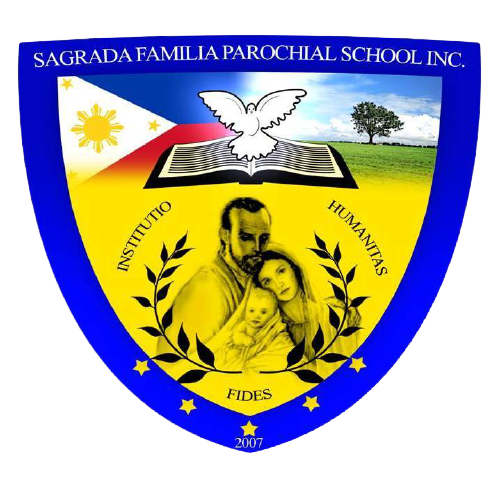Sagrada Familia Parochial School
Learning Continuity Plan
School Year 2022 - 2023
Sagrada Familia Parochial School, being a Catholic institution, reiterates its commitment to provide learning opportunities in time of this pandemic. With the desire to uphold the mission and vision of the school within the context of the new normal in education consideringthe stringentphysicaldistancingmeasureshavetobeobserved,thetraditional way of student-teacher interaction in a classroom setting is a significant challenge both for the learners and teachers. This is where the learning continuity plan of the school will be implemented. The main objective is to ensure delivery of learning in different modalities while protecting the health, safety, and well- being of the learners and the school community.
-
Learning Modality
The school will be adapting the Hybrid learning / Blended learning for SY 2022 - 2023:
This delivery of learning refers to the learning that takes place between the teacher and the learner in different locations during instruction. It is the combination of face-to-face classes with online distance learning. The learners will be divided into two groups wherein each group will have a teacher-student interaction in a physical classroom setting on alternate days in a week and doing online activities on remaining week days. The reduced number of students per group in a class will ensure the observance of proper physical distancing and health safety measures of the school.
Online approach happens when classes are conducted online synchronously, where teachers and learners do not have to meet in person in a regular classroom setting. It is administered by the teacher on a virtual platform based on an identified real-time schedule and accomplishes assigned tasks all throughout the allotted time. This approach is more interactive because the learners’ responses are real-time. The learners may download their learning materials, complete and submit assignments through the learning management system.
Learning Management System (LMS) a platform that facilitates the management, delivery, and measurement of a school’s e-learning programs which is Google Classroom under the Google Suite for Education tools.
Synchronous tasks are activities that require students to be online on a particular online platform at the same time. This includes attending video conference classes, answering online quizzes, and other simultaneous online learning activities where the participants are from various locations.
Asynchronous tasks are activities that allow students to log in and communicate with teachers at different times. There is no need to be on a particular platform at the same time. These activities include assignments, answering worksheets and workbooks with or without online support, short-and-long-term home-based projects.
-
Academic Framework
Religion, being the core, is the most important part of the curriculum. In this area, the students are taught how mighty, caring, loving, and merciful God is. Jesus as a brother, redeemer and healer, the Holy Spirit as the giver of life, the Blessed Mother as our loving mother, as well as the importance of prayers. Lives and stories of saints that need to be modeled and emulated will also be taught. Values will be integrated in all lessons not only in religion but in all subject areas.
Pre-Elementary Curriculum
The pre-elementary curriculum has been crafted using the thematic or integrative approach to curriculum development in a spiraling learning process. This approach employs integrative and interactive teaching-learning strategies as well as child-centered learning experiences. The program must be engaging, creative, child- centered, and follow developmentally appropriate practices which immerse the learners in meaningful experiences. Learners are given equal opportunities to effectively promote their physical, social, cultural, emotional, and intellectual development, including values formation to ascertain school readiness.
Elementary Curriculum
The school provides an environment conducive to learning that allows a child to develop physically, emotionally, psychologically, and spiritually in all levels of his being. The members of the school create activities that will boost students’ confidence and cooperation and enhance skills of working together as a family. Aside from the importance of the development of the children, the abilities and interests were considered in the curriculum development making it enriched, responsive, seamless, learner – centered, and decongested. At the same time, the role of the teacher as mentor, guide and facilitator of learning is not taken for granted.
The curriculum is redesigned in accordance with, but not limited to DepEd's Matrix of Most Essential Learning Competencies for this school year. It is defined as the essential and necessary competencies a learner should acquire to further continue their studies in their respective grade levels. It covers relevant life skills that respond to the needs of the learners that reflect their experiences with purpose and impact.




